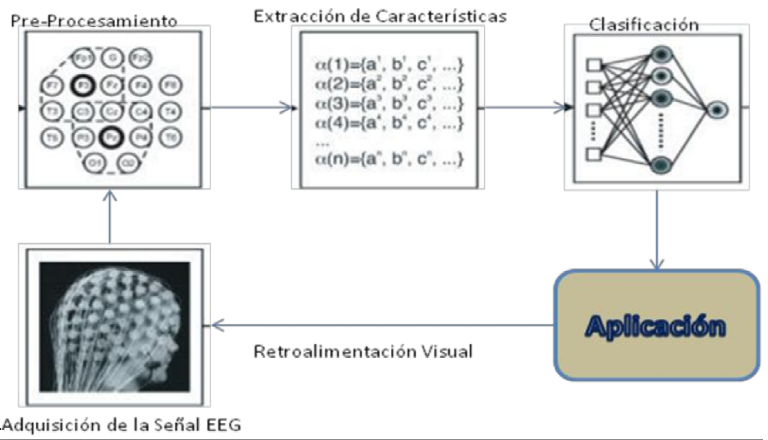ICC como instrumento de comunicación para pacientes en estado vegetativo
Contenido principal del artículo
Resumen
El objetivo del presente artículo es introducir y presentar las interfaces cerebro-computador (BCI por sus siglas en ingles) como un sistema de comunicación con personas en estado vegetativo. Usando las señales de las funciones mentales creadas por el cerebro, podemos intercambiar preguntas y respuestas, tareas y reacciones y en general para interactuar con las personas con una pérdida de sus capacidades normales de comunicación. Para alguna definición, el estado vegetativo describe el comportamiento del observador. Una BCI normalmente es implementada usando electrodos para capturar las señales EEG para luego implementar procesos de extracción de características y finalmente aplicar métodos de clasificación.
##plugins.themes.bootstrap3.displayStats.downloads##
##plugins.themes.bootstrap3.displayStats.noStats##
Detalles del artículo
Cómo citar
ICC como instrumento de comunicación para pacientes en estado vegetativo. (2012). MASKAY, 2(1), 64-67. https://doi.org/10.24133/maskay.v2i1.149
Número
Sección
ARTÍCULOS TÉCNICOS

Esta obra está bajo una licencia internacional Creative Commons Atribución 4.0.
Los autores que publican en esta revista están de acuerdo con los siguientes términos: Los autores conservan los derechos de autor y garantizan a la revista el derecho de ser la primera publicación del trabajo al igual que licenciado bajo una Creative Commons Attribution License que permite a otros compartir el trabajo con un reconocimiento de la autoría del trabajo y la publicación inicial en esta revista. Los autores pueden establecer por separado acuerdos adicionales para la distribución no exclusiva de la versión de la obra publicada en la revista (por ejemplo, situarlo en un repositorio institucional o publicarlo en un libro), con un reconocimiento de su publicación inicial en esta revista. Se permite y se anima a los autores a difundir sus trabajos electrónicamente (por ejemplo, en repositorios institucionales o en su propio sitio web) antes y durante el proceso de envío, ya que puede dar lugar a intercambios productivos, así como a una citación más temprana y mayor de los trabajos publicados.Cómo citar
ICC como instrumento de comunicación para pacientes en estado vegetativo. (2012). MASKAY, 2(1), 64-67. https://doi.org/10.24133/maskay.v2i1.149

